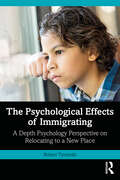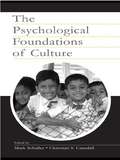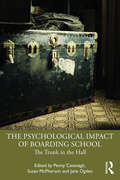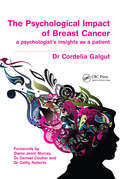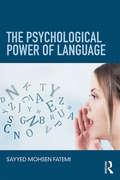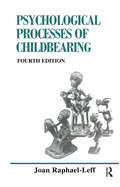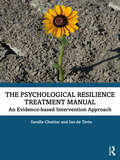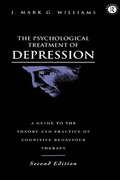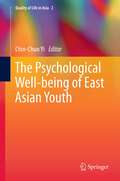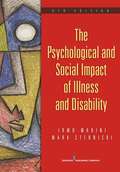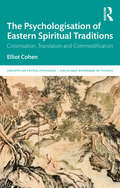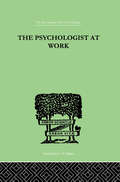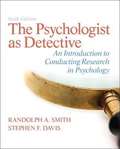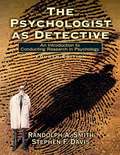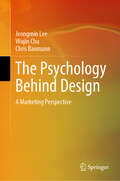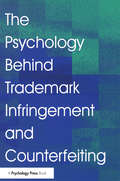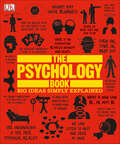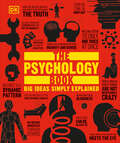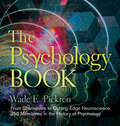- Table View
- List View
The Psychological Effects of Immigrating: A Depth Psychology Perspective on Relocating to a New Place
by Robert TyminskiExploring immigration from psychological, historical, clinical, and mythical perspectives, this book considers the varied and complex answers to questions of why people immigrate to entirely new places and leave behind their familiar surroundings and culture. Using research reviews, extensive case material, and literary examples (such as Virgil’s The Aeneid), Robert Tyminski’s work will deepen readers’ understanding of what is both unique and universal about migratory experiences. He addresses the negative consequences of xenophobia, the acculturation experiences of children compared to adults, the trauma and psychological issues that arise when seeking refuge or relocating to a new country, and the more recent implications of COVID-19 upon border crossings. Tyminski also re-evaluates the term identity as a psychological shorthand, suggesting that it can flatten our understanding of human complexity and erase migrant and refugee life stories and differences. As one of few books to investigate immigration from a Jungian-oriented perspective, Robert Tyminski’s work offers a new and broad perspective on the mental health issues related to immigration. This book will prove essential for clinicians working with refugees and migrants, when in training and in practice, as well as students and practitioners of psychoanalysis seeking to deepen their understanding of migratory experiences.
The Psychological Effects of War and Violence on Children
by Nathan A. Fox Lewis A. LeavittThe outgrowth of a conference planned as a response to the need for researchers and clinicians to develop integrated plans for addressing the psychological trauma of children exposed to violence, this volume's goals are: * to summarize research on the subject with particular emphasis on the Gulf War; * to use this information to formulate an outline of what current knowledge suggests are reasonable approaches to public mental health intervention; and * to develop an agenda for future research necessary for improving clinical efforts in varying international conflicts. A significant collection of diverse perspectives attending to a diversity of cultural and political contexts, the contributors offer many conclusions about important dimensions for analyzing the effects of violence on children. Suggesting informed approaches to public mental health efforts which can be implemented, the work presented here directs attention to the need for interdisciplinary collaboration among researchers and clinicians to better understand the effects of exposure to violence on the psychological well being of children and the optimal modes of remediation on individual, family, and community levels.
The Psychological Foundations of Culture
by Christian S. Crandall Mark SchallerHow is it that cultures come into existence at all? How do cultures develop particular customs and characteristics rather than others? How do cultures persist and change over time? Most previous attempts to address these questions have been descriptive and historical. The purpose of this book is to provide answers that are explanatory, predictive, and relevant to the emergence and continuing evolution of cultures past, present, and future. Most other investigations into "cultural psychology" have focused on the impact that culture has on the psychology of the individual. The focus of this book is the reverse. The authors show how questions about the origins and evolution of culture can be fruitfully answered through rigorous and creative examination of fundamental characteristics of human cognition, motivation, and social interaction. They review recent theory and research that, in many different ways, points to the influence of basic psychological processes on the collective structures that define cultures. These processes operate in all sorts of different populations, ranging from very small interacting groups to grand-scale masses of people occupying the same demographic or geographic category. The cultural effects--often unintended--of individuals' thoughts and actions are demonstrated in a wide variety of customs, ritualized practices, and shared mythologies: for example, religious beliefs, moral standards, rules for the allocation of resources, norms for the acceptable expression of aggression, gender stereotypes, and scientific values. The Psychological Foundations of Culture reveals that the consequences of psychological processes resonate well beyond the disciplinary constraints of psychology. By taking a psychological approach to questions usually addressed by anthropologists, sociologists, and other social scientists, it suggests that psychological research into the foundations of culture is a useful--perhaps even necessary--complement to other forms of inquiry.
The Psychological Impact of Boarding School: The Trunk in the Hall
by Jane Ogden Susan McPherson Penny CavenaghThe Psychological Impact of Boarding School is a collection of research-based essays answering a range of questions about boarding school and its long-term impact. Through a combination of original in-depth first-person narratives as well as larger scale surveys, this book aims to fill gaps in current boarding school research and present new findings. Topics addressed include gender differences, eating behaviours, loneliness, mental health and relationships, the differences between younger and older boarders, and ex-boarder experiences of therapy. The research results highlight a key role in the age that children start boarding, the way that long-term psychological influences of friendships formed at school, and the larger role that parent and family relationships play in the psychological lives of boarders. Through these findings, the book ultimately challenges the current understanding of 'boarding school syndrome', proposing a move beyond the term and its concept. The book will appeal to psychologists, psychoanalysts, counsellors, academics, teachers, current and ex-boarders as well as parents and guardians interested in the impact of boarding schools from either a professional or a personal perspective.
The Psychological Impact of Breast Cancer: A Psychologist's Insight as a Patient
by Cordelia Galgut'It's rare to find a professional in the field of health care who understands the psychology of such a frightening experience and who has also been through it herself. Cordelia's book will ring true to every woman who has experienced breast cancer and will, I hope, offer insight to doctors and nurses.' - From the foreword by Jenni Murray OBE What is it like to experience breast cancer? This book presents rare and valuable insights into the impact of diagnosis, treatment and prognosis from a woman who has experienced breast cancer as both patient and as health professional. It informs and educates readers about the psychological realities of living with breast cancer, of treatments such as surgery and radiotherapy, and the impact of social and historical attitudes to the breast and breast cancer on a woman's experience of the disease. The conflicts Cordelia Galgut experienced between conventional wisdom and her own first-hand experience are explored vividly and reflectively. The Psychological Impact of Breast Cancer is vital reading for medical and mental health professionals and trainees working with breast cancer patients, and for those who are affected by or have an interest in the condition. 'The aim of this book, and the way forward, is to understand that we must all be more sensitive to the feelings of patients and to the suffering, uncertainty and sense of vulnerability that this disease imposes upon them.' - Dr Carmel Coulter in her Foreword 'This book has helped me understand the complexities that my patients present and has turned me into a better doctor. It has eased my way along the road that I now travel as a cancer survivor.' - Dr Cathy Roberts in her Foreword ]
The Psychological Origins of Institutionalized Torture (Routledge Research International Series in Social Psychology #No.4)
by Mika Haritos-FatourosOriginal research, including interviews with former Greek torturers, is supplemented by discussion of former studies, military records and other sources, to provide disturbing but valuable insights into the psychology of torture. The book describes parallel situations such as the rites of passage in pre-industrial societies and cults, elite Corps military training and college hazing, eventually concluding that the torturer is not born, but made.Of essential interest to academics and students interested in social psychology and related disciplines, this book will also be extremely valuable to policy-makers, professionals working in government, and all those interested in securing and promoting human rights.
The Psychological Power of Language
by Sayyed Mohsen FatemiThis volume shows how the psychology and power of language can create realities. It examines the psychological implications of language as a way of being and not just as an instrument of communication. It discusses how a shift in language gives rise to an existential transformation, and shows how creative modes of expression lead to a radical transformation of beings. Throughout, both the theoretical and practical implications of the psychological power of language are presented, particularly how language may result in a healthier inter- and intrapersonal world. It will interest upper-level students and researchers of language in Psychology, Linguistics, Philosophy and Education, as well as professional counselors.
The Psychological Processes of Childbearing: Fourth Edition
by Joan Raphael-LeffChildbearing seems eternal, primordial and universal. Yet human reproduction in the 21st century is in a state of flux. This accessible book highlights dramatic changes that have occurred over the last decades, focusing on both individual and cross-cultural diversity across the now elongated childbearing cycle and the uniqueness of desire and emotional experience. It does so by locating the transition to parenthood in its psycho-sexual and socio-economic context, emphasising interweaving internal/external realities and our inherent interconnectedness with others. Included are conscious and unconscious factors determining beliefs, expectations and parenting practices, and ways in which these are affected by rapid urbanisation, shrinking families, societal instability, HIV, governmental maternity and child care policies, and attitudes of professionals. Drawing widely on empirical and clinical research from disparate disciplines psychoanalytic, neuro-scientific, neonatal, sociological, obstetric, anthropological and midwifery this resource book synthesises these to illustrate a spectrum of processes affecting each person's mental health.
The Psychological Resilience Treatment Manual: An Evidence-based Intervention Approach
by Saralla Chettiar Ian de TerteThe Psychological Resilience Treatment Manual (PRTM) provides mental health professionals with an evidence-based guide to psychological resilience treatment designed to equip clients with a toolbox of adaptive coping strategies. This intervention treatment manual is for practitioners working with clients to develop resilience and the skills they need to cope with daily challenges, reduce stress levels, and increase general well-being without necessarily diagnosing a specific disorder, such as anxiety or depression. The manual is structured around four guided intervention modules: Passive Coping, Self-Care Behaviour, Social Support, and Active Coping. Each module encompasses four one-hour sessions and includes a contents framework, overview, and target objectives for each session. The manual includes 16 client worksheets that correspond to each session, and relapse prevention therapy is incorporated at the end of each module. Flexible in nature, the manual can be used by practitioners in its entirety or modules can be selected as appropriate, depending on a client’s needs. The Psychological Resilience Treatment Manual is an essential resource for qualified and registered psychologists, qualified cognitive behavioural therapy (CBT) practitioners, psychiatrists, and postgraduate counselling psychology students.
The Psychological Significance of the Blush
by W. Ray Crozier Peter J. de JongThe blush is a ubiquitous yet little understood phenomenon which can be triggered by a number of self-conscious emotions such as shame, embarrassment, shyness, pride and guilt. The field of psychology has seen a recent surge in the research of such emotions, yet blushing remains a relatively neglected area. This unique volume brings together leading researchers from a variety of disciplines to review emerging research on the blush, discussing in depth issues that have arisen and stimulating new theorizing to indicate future directions for research. Topics covered include: the psychophysiology of the blush; developmental aspects; measurement issues; its evolutionary significance and the role of similar colour signals in the social life of other species; its relation to embarrassment, shame and social anxiety; and the rationale for, and clinical trials of, interventions to help people suffering from blushing phobia.
The Psychological Treatment of Depression: A Guide To The Theory And Practice Of Cognitive-behavioural Therapy
by J. Mark Williams'A clear, rigorous account of cognitive behavioural methods for treating depression.' - British Journal of PsychiatryThe use of behavioural and cognitive techniques for treating depression has yielded exciting results. Cognitive Behaviour Therapy (CBT) is as effective in the short term as anti-depressant drugs and has longer-lasting effects than medication. This book brings together assessment and treatment techniques of proven efficacy, describing them in usable detail and setting them in the context of current psychological theories of depression. It is an invaluable guide to practitioners wishing to make use of CBT.
The Psychological Well-being of East Asian Youth
by Chin-Chun YiThe rapid social change in the East Asia has brought great research attention on the family, education and political impacts. The growth trajectory of the next generation is exposed to an entirely different context owing to the dual effects of traditional and modern values as well as practices. This book provides an overall picture of the developmental trajectory of Taiwanese youth as a typical example in the region. The time frame is set from early adolescence (13years old) to young adulthood (22yeard old). Individual psychological well-being in its broad definition will be used as the outcome indicator to reflect significant developmental processes during this important transitional life course. Benefitted from the rare panel datasets conducted from 2000-2009, this book has two major focuses: one is to explore the interplay among family, school and community with regard to their influence on the individual growth patterns; the other is to highlight the potential constraint and/or strength of the prevailing social norms and values shared among East Asian societies. To be specific, different chapters will describe and analyze the life chances and growth patterns among youth with different social capitals (including family SES, educational achievement, rural-urban residence, etc.). Their short-term versus long-term outcome, as indicated by various psychological well-being variables (e.g., depressive symptoms, deviant or problem behaviors, happiness, edutional performance), will allow us to delineate the particular structural context that individual East Asian youth encounters and to offer constructive suggestions on family interaction, educational strategy as well as health related policies based on the scientific evidence. This book incorporates comparative reports from other East Asian societies, and from youth panel studies of Australia and the U.S.. The experience of their counter-part in the advanced societies will contribute to readers' understanding of the particular social situation that East Asian youth is embedded in the growth process. In addition, comparative perspective will enable the reader to contemplate on the potential future development of the affluent generation in the region. Since changing social structure occurred in the last few decades in the East Asia has suffered inadequate investigation in the realm of family, education and community, this book provides timely information to fill up the gap. Analyses of the valuable dataset from early adolescents to young adults will attract those who are interested in family researches, in youth studies, in panel data analyses, as well as in the social development in Taiwan and in East Asia.
The Psychological and Social Impact of Illness and Disability (Sixth Edition)
by Irmo Marini Mark StebnickiExamines current thought and treatment approaches in working with individuals with disabilities. Abundant and insightful narratives by disabled individuals offer a bridge between theory and practice for students in rehabilitation psychology and counselling courses.
The Psychologisation of Eastern Spiritual Traditions: Colonisation, Translation and Commodification (Concepts for Critical Psychology)
by Elliot CohenThis essential book critically examines the various ways in which Eastern spiritual traditions have been typically stripped of their spiritual roots, content and context, to be more readily assimilated into secular Western frames of Psychology. Beginning with the colonial histories of Empire, the author draws from the 1960s Counterculture and the subsequent romanticising and idealising of the East. Cohen explores how Hindu, Buddhist and Daoist traditions have been gradually transformed into forms of Psychology, Psychotherapy and Self-Help, undergoing processes of ‘modernisation’ and secularisation until their respective cosmologies had been successfully reinterpreted and reimagined. An important component of this psychologisation is the accompanying commodification of Eastern spiritual practices, including the mass-marketing of mindfulness and meditation as part of the burgeoning well-being industry. Also presenting emerging voices of resistance from within Eastern spiritual traditions, the book ends with a chapter on Transpersonal Psychology, showing a path for how to gradually move away from colonisation and towards collaboration. Engaging with the ‘mindfulness movement’ and other practices assimilated by Western culture, this is fascinating reading for students and academics in psychology, philosophy and religious studies, as well as mindfulness practitioners.
The Psychologist At Work: An Introduction to Experimental Psychology (International Library Of Psychology Ser. #Vol. 106)
by Harrower, M RFirst Published in 1999. Routledge is an imprint of Taylor & Francis, an informa company.
The Psychologist as Detective: An Introduction to Conducting Research in Psychology
by Randolph A. Smith Stephen F. Davis<p>The Psychologist as Detective introduces students to the research process. The authors treat psychological research as a detective case in which a problem is presented, clues are discovered, evidence is evaluated, and a report is prepared for consideration by peers. <p>Upon completing this book, readers will be able to: <p> <li>Think critically about research and research methods <li>Analyze research as a problem solving procedure <li>Develop research skills by looking at examples of research studies <li>Evaluate evidence from a research study and prepare a report or summary of the case</li></p>
The Psychologist as Detective: An Introduction to Conducting Research in Psychology (Fourth Edition)
by Randolph A. Smith Stephen F. DavisThe Psychologist as Detective conveys the excitement of research methodology through a lively, conversational style. To make the study of the research process interactive and accessible for readers, pedagogical features and critical thinking activities are integrated throughout the volume. Actual student research appears in each chapter to increase relevance and heighten reader interest. This text evaluates the science of psychology, research ideas and hypotheses, ethics, nonexperimental methods and the basics of experimentation variables and control, statistics, designing-conducting-analyzing and interpreting experiments, as well as alternative research designs, external validity, critiquing experimental research and writing and assembling an APA-format research report. For individuals involved with or interested in psychological research.
The Psychologist's Companion
by Robert J. Sternberg Karin SternbergThe Psychologist's Companion is intended for students as well as young professionals and writers at all stages of their careers seeking inspiration and guidelines for better scientific writing. This book is also a resource for researchers in related fields. It has been comprehensively updated, revised, and extended for its fifth edition and includes the latest style guidelines of the American Psychological Association's Publication Manual (sixth edition, 2009) as well as chapters encompassing the entire research process from doing literature research and planning an experiment to writing the paper. It features new chapters on literature research; ethics; and generating, evaluating, and selling ideas. The Psychologist's Companion also provides information on writing book proposals, grant proposals, and lectures.
The Psychologist's Companion for Undergraduates
by Karin Sternberg Robert J. SternbergTailored specifically for undergraduate students, this Companion offers uniquely comprehensive coverage of the topics necessary for successful communication in psychology, making it a valuable resource for research methods and introductory psychology courses. Readers will learn how to effectively plan and write papers in accordance with the latest style guidelines from the Publication Manual of the American Psychological Association, Sixth Edition; present data in posters and talks; and evaluate their own and others' work. The clear writing style and reader-friendly format, meanwhile, allow students to absorb information easily, even when reading chapters selectively or out of order. The book includes numerous up-to-date examples drawn from career experiences to engage students and help them apply what they've learned to forward their own careers, while questions encourage them to think more deeply about larger issues in the field, preparing them for future research.
The Psychologist’s Companion
by Karin Sternberg Robert J. SternbergThe Psychologist's Companion is intended for students as well as young professionals and writers at all stages of their careers seeking inspiration and guidelines for better scientific writing. This book is also a resource for researchers in related fields. It has been comprehensively updated, revised, and extended for its fifth edition and includes the latest style guidelines of the American Psychological Association's Publication Manual (sixth edition, 2009) as well as chapters encompassing the entire research process from doing literature research and planning an experiment to writing the paper. It features new chapters on literature research; ethics; and generating, evaluating, and selling ideas. The Psychologist's Companion also provides information on writing book proposals, grant proposals, and lectures.
The Psychology Behind Design: A Marketing Perspective
by Chris Baumann Jeongmin Lee Wujin ChuThis book explains the psychology theory behind design using plain language. The inspiration came from the "democratic design" philosophy of IKEA. This book attempts to help people enjoy designs more, by explaining consumer psychology that lurks behind designs of everyday things. Another purpose of the book is to aid designers and marketers in understanding consumer behavior and to help them leverage this knowledge in their respective fields. Marketers and designers often find it hard to communicate effectively due to their disparate fields. However, this book aims to bridge this gap by showing that activities in both design and marketing can be better understood through the lens of design psychology, promoting better communication and collaboration. Although the book contains more than a hundred psychology theories that can affect design, it is structured in a reader-friendly manner, and chapters are segmented such that each chapter contains about 7~15 theories. Despite the large amount of academic research behind the theories, the application of these theories comes from commonplace consumer behaviors and daily design examples, promising an easy, relatable read.
The Psychology Behind Trademark Infringement and Counterfeiting
by J. L. ZaichkowskyAs those involved in commerce are aware, preventing competitors and others from imitating successful brands is a difficult and costly task. This book serves to inform the reader concerning complexities of the issues of brand imitation, integrating the disciplines of psychology, business, and law to the area of trademark infringement and counterfeiting. Principles and theories from psychology and how they are relevant to consumers' perceptions in the marketplace are used to explain why competitors steal the intellectual property of another company or entity. The possibility of brand imitation or counterfeiting should be contemplated in designing new products or brand packaging, just as it is in the printing of currency. It is the intent of The Psychology Behind Trademark Infringement and Counterfeiting to provide those involved in commerce with some understanding, some ideas, and perhaps some strategy for building differentiated brands that are easy to protect. Brand managers, expert witnesses to trademark cases, intellectual property lawyers, and academics of consumer behavior and marketing will find this book useful to understanding consumer motives and processes of trademark infringement and counterfeiting. It could be used as a textbook in courses on marketing.
The Psychology Book: Big Ideas Simply Explained (DK Big Ideas)
by DKLearn about human nature, behavior and how the mind works with The Psychology Book.Part of the fascinating Big Ideas series, this book tackles tricky topics and themes in a simple and easy to follow format. Learn about Psychology in this overview guide to the subject, great for beginners looking to learn and experts wishing to refresh their knowledge alike! The Psychology Book brings a fresh and vibrant take on the topic through eye-catching graphics and diagrams to immerse yourself in. This captivating book will broaden your understanding of Psychology, with:- More than 100 ground-breaking ideas in this field of science- Packed with facts, charts, timelines and graphs to help explain core concepts- A visual approach to big subjects with striking illustrations and graphics throughout- Easy to follow text makes topics accessible for people at any level of understandingThe Psychology Book is the perfect introduction to the science, aimed at adults with an interest in the subject and students wanting to gain more of an overview. Here you&’ll discover key concepts by psychologists who have significantly enhanced our understanding of the human mind and behavior. Learn about everyone who&’s contributed to the big ideas in psychology, incorporating the ideas of today&’s scientists as well those of the ancient philosophers and pioneers. Your Psychology Questions, Simply ExplainedIf you thought it was difficult to learn psychology and its many concepts, The Psychology Book presents the key ideas in a clear layout. Learn about the key personalities of the 19th and 20th centuries whose work has made significant contributions to our understanding of human behavior. Fantastic mind maps and step-by-step summaries explain the line of thought clearly for students of psychology and for anyone with a general interest in understanding the human mind.The Big Ideas SeriesWith millions of copies sold worldwide, The Psychology Book is part of the award-winning Big Ideas series from DK. The series uses striking graphics along with engaging writing, making big topics easy to understand.
The Psychology Book: Big Ideas Simply Explained (DK Big Ideas)
by DKLearn about human nature, behavior and how the mind works with The Psychology Book.Part of the fascinating Big Ideas series, this book tackles tricky topics and themes in a simple and easy to follow format. Learn about Psychology in this overview guide to the subject, great for beginners looking to learn and experts wishing to refresh their knowledge alike! The Psychology Book brings a fresh and vibrant take on the topic through eye-catching graphics and diagrams to immerse yourself in. This captivating book will broaden your understanding of Psychology, with:More than 100 ground-breaking ideas in this field of sciencePacked with facts, charts, timelines and graphs to help explain core conceptsA visual approach to big subjects with striking illustrations and graphics throughoutEasy to follow text makes topics accessible for people at any level of understandingThe Psychology Book is the perfect introduction to the science, aimed at adults with an interest in the subject and students wanting to gain more of an overview. Here you’ll discover key concepts by psychologists who have significantly enhanced our understanding of the human mind and behavior. Learn about everyone who’s contributed to the big ideas in psychology, incorporating the ideas of today’s scientists as well those of the ancient philosophers and pioneers. Your Psychological Questions, Simply ExplainedIf you thought it was difficult to learn psychology and its many concepts, The Psychology Book presents the key ideas in a clear layout. Learn about the key personalities of the 19th and 20th centuries whose work has made significant contributions to our understanding of human behavior. Fantastic mind maps and step-by-step summaries explain the line of thought clearly for students of psychology and for anyone with a general interest in understanding the human mind.The Big Ideas SeriesWith millions of copies sold worldwide, The Psychology Book is part of the award-winning Big Ideas series from DK. The series uses striking graphics along with engaging writing, making big topics easy to understand.
The Psychology Book: From Shamanism to Cutting-Edge Neuroscience, 250 Milestones in the History of Psychology (Union Square & Co. Milestones)
by Wade E. PickrenWhat could be more fascinating than the workings of the human mind? This stunningly illustrated survey in Sterlings Milestones series chronicles the history of psychology through 250 landmark events, theories, publications, experiments, and discoveries. Beginning with ancient philosophies of well-being, it touches on such controversial topics as phrenology, sexual taboos, electroshock therapy, multiple personality disorder, and the nature of evil.
